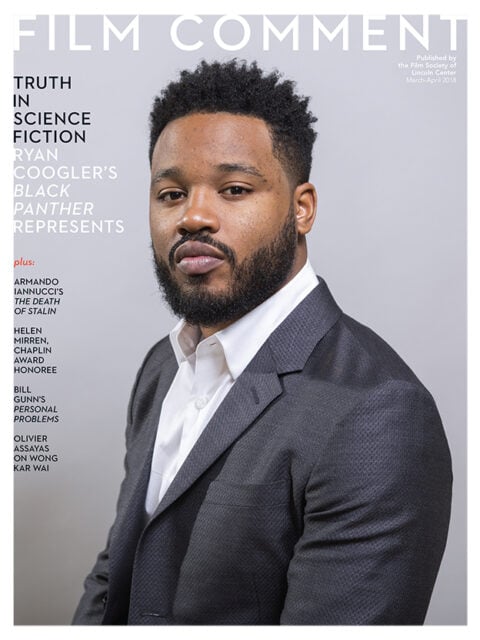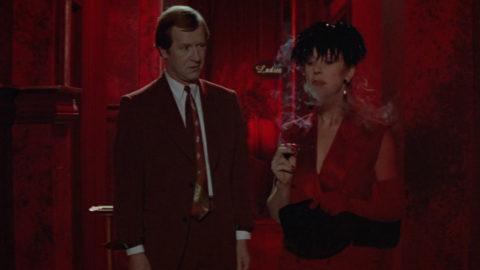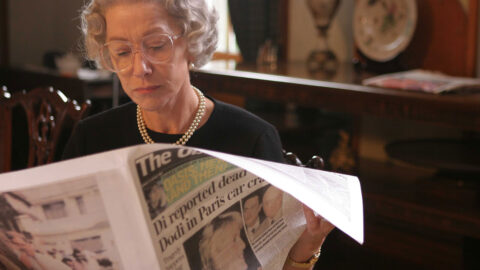To play a living person is very intimidating; you can never be as good as the real person and if you are bad, then you are just bad . . . I thought I was headed for the most almighty embarrassing fall. So again I had to do it . . . I thought that I did not have to do the most perfect impersonation, just my personal impression, fed by my own perceptions, the way a painter does.
—Helen Mirren on being cast as Queen Elizabeth II
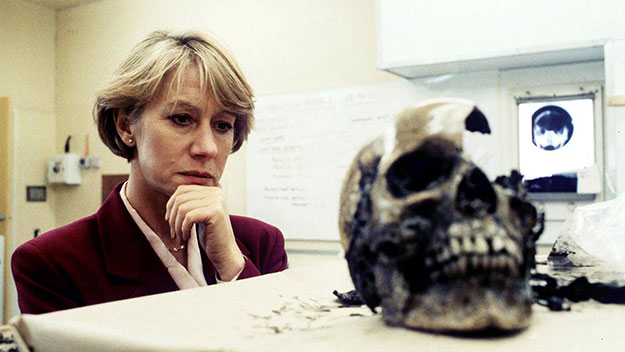
Prime Suspect
“I’m not the bloody Queen,” Detective Chief Inspector Jane Tennison scolds her abashed male driver for addressing her as “Ma’am” instead of her preferred “Guv.” Tennison may not play royalty in the hit British television crime series Prime Suspect, though she does rule there as a queen bee. But over a long career on stage and screens large and small, Helen Mirren, who plays the spiky policewoman, has enacted a raft of bloody Queens, one of whom won her a richly deserved Oscar and swelled her already solid cachet with royalty-loving American audiences.
From her early days in Britain’s National Youth Theater, where her Cleopatra attracted agents’ attention, Mirren has propped up a cottage industry of royals wielding power, libido, and bags of lavishly costumed panache. She played the fourth and, mercifully, final wife of Malcolm McDowell in the ill-starred Caligula (1979). Bewigged and brocaded, she appeared opposite Nigel Hawthorne as Queen Charlotte, the devoted 18th-century consort who tried to keep her demented husband on the throne in The Madness of King George (1994). She drew rave notices for her Elizabeth I in the television miniseries of the same name, and as Elizabeth II in Peter Morgan’s 2013 stage play The Audience, which imagines the weekly conversations between Her Royal Majesty and a fleet of Prime Ministers, all of whom she outlasted. And lest you think she’s done playing monarchs, Mirren is prepping to star as Catherine the Great in an upcoming HBO/Sky miniseries. That’s a pretty pedigreed franchise for an actress who has played more than her share of gangster’s molls, and even there she oozed her own brand of tarnished nobility.
Regal roles may have made Mirren the darling of American Anglophiles, but her long-term appeal extends far broader and deeper. Drop Mirren’s name into a conversation with those old enough to have followed her career from soup to nuts and—man or woman—their eyes light up with a mix of adoration, respect, and ongoing lust. Having joined the Royal Shakespeare Company, where she rapidly rose to play leading classical roles, the actress’s blend of luscious golden beauty, frank sexuality, and sharp intelligence built her a reputation as what the Brits call the thinking man’s crumpet.
It’s easy to see why Mirren keeps getting cast as royals. She has an irreducibly regal bearing and can do haughty on demand. Yet from the start she willingly shed the showier roles for meatier ones. Along the road to making her name in film, Mirren has been revelatory in a host of smaller treasures. She won Best Actress at Cannes as the Catholic widow of a murdered Protestant tangled up with an IRA member in the realist Irish drama Cal (1984). She is terrific as the colorlessly dour housekeeper in Robert Altman’s Gosford Park (2001) who defrosts and dissolves when her Mrs. Danvers–like cover is blown. And she is enormously moving in Fred Schepisi’s lovely 2001 Last Orders as a woolly-hatted blue-collar widow struggling to free herself from a lifelong rut as everyone’s caretaker.
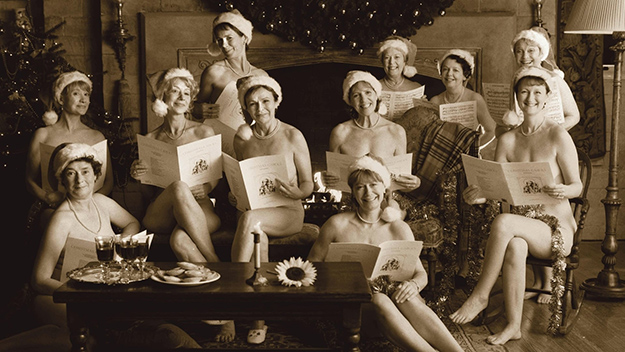
Calendar Girls
It’s hard to imagine an American megastar like, say, Meryl Streep playing understated supporting roles like these. But like all top British actors, Mirren was trained to move comfortably between ensemble roles in theater, television, and film, and she’s never been obsessed with stardom or with branding herself in a particular genre or character. She goes broad with gusto in Calendar Girls (2003) as a working-class Yorkshire matron who rallies her post-menopausal local Women’s Institute into stripping for a charity calendar. Even here Mirren refuses to ham it up: she plays her free spirit blowsy and warm, impudent and flawed, and in doing so gives us reason to believe in this shameless rip-off of The Full Monty.
Unlike Judi Dench, who has mostly stuck with playing characters from the upper rungs of posh, Mirren can and does play all sorts. Her unusually hybrid class background in the otherwise rigidly stratified class society of post–World War II Britain has likely helped: she’s a butcher’s daughter (by karma or coincidence, her maternal grandfather was butcher to Queen Victoria) and the granddaughter of a Russian diplomat who, stranded in England during the Russian Revolution, turned cab driver to support his family. RSC diction aside, Mirren proudly identifies as an “Essex girl,” an outer-London species of teenager akin to a Valley Girl, only poorer.
By temperament, politics, and culture, Mirren is also very much a graduate of the ’60s, a bolshie leftist and outspoken feminist with a rebellious streak that showed itself early and often. Barely in her twenties and fresh off a stint in experimental theater with director Peter Brook, she wrote a strong letter to The Guardian complaining about excessively elaborate sets in the Royal Shakespeare Company and the National Theater. In an infamous 1975 interview Mirren wiped the floor with Michael Parkinson, a British talk-show host whose vibe ranged from the obsequious to the obnoxious with a dash of scornful lechery reserved for young, attractive female guests. He met his match and more in Mirren, who swung into the studio brandishing an Indian feather that had taken her fancy and proceeded to eviscerate Parkinson’s every effort to belittle her as an “in-quotes serious actress” and to focus on her breasts.
Mirren hounded director John Mackenzie into fleshing out her character as Bob Hoskins’s upmarket mob moll in the excellent The Long Good Friday (1980). But her most achingly complex floozy role came later when she was cast in Peter Greenaway’s 1989 gangster art film The Cook, the Thief, His Wife & Her Lover. Mirren gets fully frontal in more senses than one to play Georgina, the abused and deeply unhappy wife of a thuggish restaurateur played by Michael Gambon. By turns gorgeously nude and baroquely tricked out in peacock hues and feathers, Mirren projected dignity, vulnerability, and a steely will to exact revenge in kind on her gluttonous tormentor. The film’s themes of assault by men with arbitrary power echo down the years with eerie resonance. But as the suffocated and abused property of one man and the uninhibited lover of another, Mirren turns its subtext into an ardent defense of sexual freedom for women. One can only imagine the lively discussion today that might follow a double bill of The Cook, the Thief, His Wife & Her Lover and Michael Powell’s 1969 Age of Consent, Mirren’s major breakthrough, in which she plays a sinuous beach-bunny ingénue who becomes a muse and more to James Mason’s aging painter.
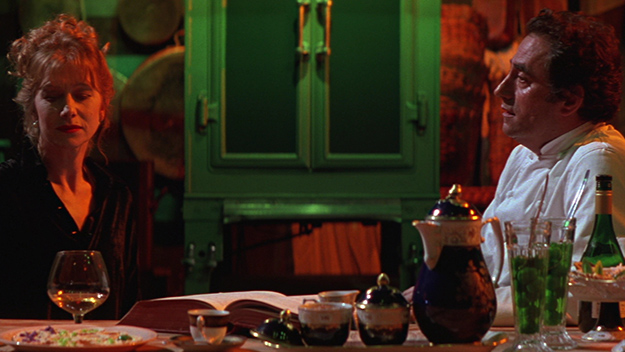
The Cook, the Thief, His Wife & Her Lover
In her Seventies Mirren remains a stylish glamour puss with an hourglass figure and legs the envy of women several decades her junior. She exults in her sexuality, but has never allowed herself to be defined by it on or off screen. Which may be why she has been an extraordinarily durable presence, if mostly in supporting roles. She landed her two greatest realist roles in middle age, when her youthful radiance deepened into mature complication as her face became at once more ordinary and more intensely capable of signaling a woman with an inner life at war with itself. In Prime Suspect and The Queen, Mirren brings to vivid, unsettling life two women whose vastly different job descriptions require them to exercise enormous self-control, hold in vast reserves of emotion, and live with paying the price. There’s a sense in which her body of work is a walking history of women demanding a place at the table on their own terms.
In Lynda La Plante’s visceral crime series Prime Suspect, an unanticipated hit on both sides of the Atlantic, Mirren’s Jane Tennison pioneers a voraciously ambitious woman cop who steps into a hornets’ nest of hostile male subordinates, and with a basketful of her own troubles that never go away even once she’s won their grudging respect. The testy cop does grow and change over seven series from 1991 to 2006, but not via the usual narrative arc of mellowing self-completion. On and off the job Tennison remains an often insensitive monomaniac whose clashing agendas—nailing a serial killer, protecting social justice, manipulating suspects in the interview room, hogging the media limelight—land her in all kinds of trouble. She constantly derails her private life and crosses lines with inappropriate affairs. Jane is no textbook feminist, but by the last series she runs a team sprinkled with women officers, whom she treats with the same peremptory gruffness she shows her male subordinates and the bosses and lovers who get in her way.
All this Mirren renders without vanity and often without makeup, right down to the off-the-peg suits and wash-and-wear bob. Leading with the stubborn set of her jaw, Mirren projects a cast-iron public cool and an inward vulnerability and self-doubt that suggest all the anger, humiliation, and instinctive tenderness that Tennison has suppressed or forgone to get where she is. Having cracked her last case and shredded anything that might be called a personal life to rise in the only profession she’s ever wanted, Jane jettisons her own retirement party and slips quietly out the door. It is characteristic of this marvelously sly actress that the now-former cop is wearing the ghost of a wry smile, just enough to make us root for a sequel about Tennison not coping with retirement in Florida.
Flawed female cops come a dime a dozen in today’s television, but without Mirren opening that door (late in life, she has gone on to play women with guns in a bunch of forgettable action movies of which it can only be said that she never rolls her eyes), there would be no Happy Valley, no Broadchurch, no The Bridge or The Closer or The Killing, to name but a few. Tennison is emblematic of the struggles of the first generation of British women of humble origin (I was one of them) to go to college and emerge brimming with ambition—only to enter workplaces filled with men unprepared for them and, typically, openly hostile to their presence. Like Tennison, Mirren chose to remain childless for the freedom to pursue her career. Like her, too, she remained unmarried for many years, opting for a freewheeling romantic life that included four years with a substantially younger Liam Neeson, whom she met on the set of John Boorman’s Excalibur (1981).
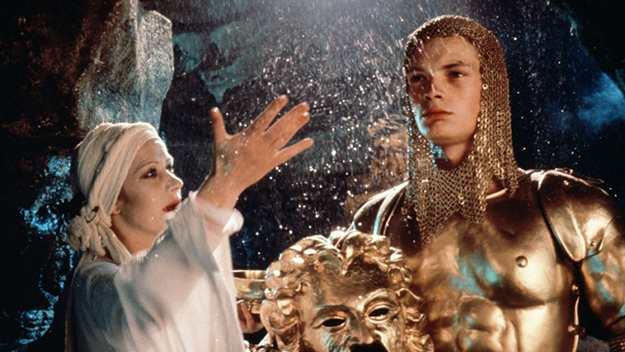
Excalibur
If Jane Tennison catalyzed one late-20th-century woman’s triumphs and challenges in a man’s world, the other great performance of Mirren’s career probes the psyche of another as she struggles with the possibility of becoming a fossil in a millennial world she doesn’t understand or much like. In Mirren’s Academy Award–winning turn as the frumpy, politically astute Elizabeth II in The Queen, Her Majesty faces a real-life crisis in public outrage over her efforts to keep the 1997 funeral of the widely adored Princess Diana under wraps. At stake is the continued support for a monarchy stuck in the past and, the movie suggests, at once woefully and admirably out of step with a populist modern Geist. Shaken to her core by her people’s adulation for a Princess she had never really accepted, the Queen must hang on to her sangfroid while allowing herself to be dragged into the 21st century by her aggressively forward-looking Prime Minister, Tony Blair (Michael Sheen).
Her Majesty’s a pretty nice girl, as the old Beatles song goes, but in Mirren’s reading she’s a bit of a stiff to boot. Along with layers of padding, Mirren adds dimension that’s equal parts arch critique and sympathy. The fun part is watching an actress who’s known for her erotic allure transform herself into a 71-year-old frumpy dresser of upstanding moral backbone and no appetite for moving with the celebrity-obsessed times. It’s no stretch at all to picture a much younger Mirren frisking things up as Princess Margaret even as she flags the sadness of a life as eternal second banana. Mirren’s Elizabeth has dignity to burn, but unlike her waywardly sexual sister she’s almost painfully reserved and uncomfortable in her own skin. Resplendent in twinset and pearls and shampoo-and-set gray curls, Mirren’s Elizabeth marches around Buckingham Palace, fretting and brooding as she tries to stem the flow of diplomatic wreckage and get with the program of public mourning. As she goes walkabout outside the Palace amid the mountain of flowers left by her subjects for Diana, her face flickers with reluctance, fear of being eclipsed, gratitude for a bouquet from a small child, and finally a dawning awareness that modernity has come for her, and she must adapt or go under.
Mirren gives an inward, yet intensely physical performance in which her anger and frustration come out in the furious vigor with which she cleans her spectacles on her sleeve or compulsively rubs an eyebrow. Yet the Queen remains her stubbornly regal self, letting down her guard only for a moment when she catches sight of a beautiful stag in the hills around her beloved Balmoral—just as Jane Tennison, alone in her office, takes a beat to shed tears for the baby she has just aborted and for a toddler she couldn’t save. And then the Queen and the Cop, brought to you by an actress with as much staying power as they, get back to work, two great women closing out a century that invited them to the party, then did its utmost not to let them stay.
Closer Look: Helen Mirren will receive the Film Society of Lincoln Center’s annual Chaplin Award on April 30.
Ella Taylor writes about film for NPR.org, The Criterion Collection, and others. She teaches in the School of Cinema at the University of Southern California.



